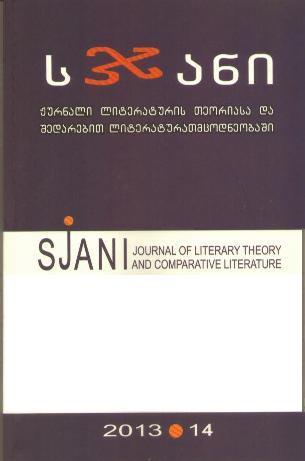ქართულ–რუსული სამეცნიერო თარგმანი ჰუმანიტარული მეცნიერების სფეროში: პრობლემები და მთარგმნელობითი სტრატეგიები
Georgian-Russian Scientific Translation in Space of Humanitarian Knowledge: Problems and Strategies of Translation
Author(s): Irine ModebadzeSubject(s): Literary Texts
Published by: ლიტერატურის ინსტიტუტის გამომცემლობა
Keywords: translatology; scientific translation; Georgian-Russian translation.
Summary/Abstract: Georgian-Russian Scientific Translation in Space of Humanitarian Knowledge: Problems and Strategies of Translation Summary Key words: translatology, scientific translation, Georgian-Russian translation. The necessity and importance of intercultural dialogue has significantly increased in conditions of rapid processes of integration in the united cultural space of globalization and national cultures. Accordingly, it is turning timely to pass accumulated humanitarian knowledge: translating scientific works concerning the basis of historical and cultural mentality into foreign languages. Not only do those translations help the process of familiarizing with achievements of scientific thinking but it also supports the understanding of those mechanisms which form the basis of national cultural developments (see Delioz and Lankin). Translating scientific literature (creating an adequate text) first of all means to adequately transfer theme and argumentation, or an informative content of the text. Unlike technical scientific texts, those texts regarding humanitarian fields are polemical as a rule and stand out for using methods characteristic of expressive communication. Referring Грузино-русский научный перевод в сфере гуманитарного знания: проблемы и переводческие стратегии to those definitions proposed by Ryce, we can sort the texts of Literary Studies according to their specificity as “pragmatic” (content-oriented) and “aesthetic” (of more a literary one). Not only information of an original text but also its energetics, or an emotional or expressive impact on the reader should be adequately reflected in the translation. So, the specificity of translation requires transferring all the meanings of the content of an original text as well as the style of an author and logics of thinking. Accordingly, the technologies of translating Georgian texts into Russian and the methods of combining them are considered as both: the technique of transferring information from one language and cultural space to another and focusing on the hermeneutical functions of original texts. A wide range of the most wide-spread problems are analyzed in these terms: lexical difficulties preventing from better comprehending a translated text, communicative barriers, (logical, stylistic and semantic), compositional irrelevance etc. In order to generalize the methods of dealing with these matters and analyze them in theoretical terms, an author tries to rely on practical experience.
Journal: სჯანი
- Issue Year: 2013
- Issue No: 14
- Page Range: 192-205
- Page Count: 13
- Language: Russian

